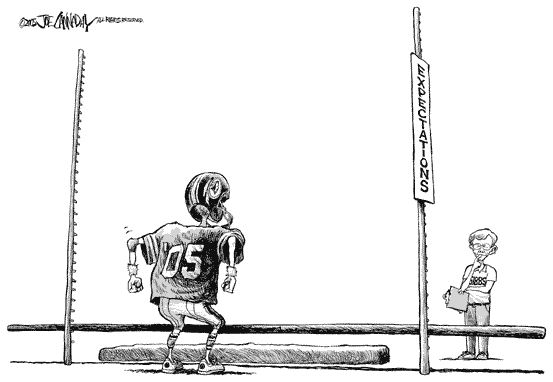At the same time if any player was going to dribble in infinite circles away from the goal line, it was him. He could boot a devastating shot into the stands, even when he has wide open teammates he could have passed to, sometimes you felt like his teammates were playing at half speed because they were tired of watching him monopolize the ball. Contrasted with Oliseh, his less talented but more efficient midfield partner, most people preferred Oliseh’s game. Oliseh was economical with his approach, he seemed to like one touch football and all that; but at the end of the day, we all came to watch Okocha play, if anybody could create magic on the pitch he was the one. It was common place to blame Okocha whenever Nigeria lost. He dribbled too much, he does not pass, he is too offensive minded and does not do enough on defense.
Which now brings me to the point of this conversation, is it his duty to tone down his game to make his teammates comfortable or should they be the ones to raise their game in order to play at his level? Last night on TNT, Chris Webber in discussing the upcoming NBA All-star Game noted that he played for good teams and bad teams. On both teams, his workout routine was the same and his effort was the same. Unfortunately, outcomes were different because on the bad teams the other people (team managers, teammates ETC) were not as good, so he did not win as much. Since C-Webb did not get to pick his teammates, he didn't think he should be penalized for this outcome? I guess what he was basically getting at was, whether he is still a winner if he does the same things a winner does but does not get the same results? You will find that this occurs more often in life than you would care to admit.
Imagine this, you are working hard, doing everything right but your company is failing, one day they layoff everybody and you hit the unemployment line through no fault of your own. While you can take solace in the fact that it is not your fault, but the fact is you are in the same position as the bum that shows up for work late and rarely achieved any of his job goals. In this example while your individual performance was stellar, your team sucked. How can you be considered a success, when your team is not doing well? In basketball more than any other sport this is a common phenomena. Back in 2005/2006 Kobe Bryant of the Lakers, was surrounded by four stiffs, he played like a maniac, even once scoring 81 points in a game. He was willing to taking on a disproportionate proportion of his team’s offensive possessions just to make sure his team had a chance, despite all this, his team did not do very well and he was called a loser, not a good leader, whatever. Now his team is winning at a ridiculous clip, he is still putting out the same effort but all of a sudden, he has matured and is now a team player but the truth is, the only real difference between then and now, is that his teammates are better.
Consider this, you work in a call center, the layabouts that are your colleagues find any excuse not to show up for work or answer the phone. They are constantly rude to customers, they don’t follow procedure and generally create a hostile work environment. Is it your place to show them how do a better job? knowing that if they fail, you all fail. Or is it enough, for you to do your very best and hope that when the end comes you can hold your head high knowing that you did all that you could? Even if in the end you all fail collectively as a group.

